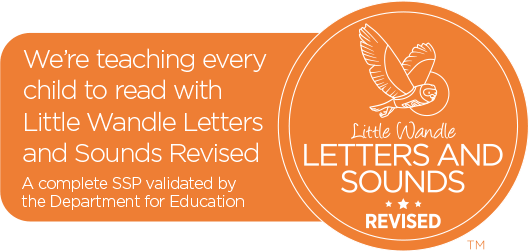What does Reading look like at Kingfisher?
Our Aim is that: Every child will leave us a reader, opening the doors and opportunities for a better future.
We use Little Wandle - Foundations for Phonics in our EYFS, Main Programme in Reception and Year 1
Reception Year 1 and Year 2 have Reading Practice 3 x a week with a LW trained teacher using a phonically matched book, there are 3 sessions every week focusing on Decoding, Prosody and Comprehension. The Phonically matched Book then goes home Thursday – Monday. Pupils also take home a non phonically matched sharing book Monday – Monday.
In Year 2 pupils follow Little Wandle Phase 5 Review, Bridge to Spelling and Spelling Units in Y2 (although this is primarily spelling it still has a huge emphases on reading. Once pupils have successfully completed the phonics programme, then the choice of books to read that pupils are given is equally critical. These need to be:
- Engaging and age-appropriate
- Relevant to their interests and learning
- Across a range of genres
- Colour banding and levelling of books are not encouraged.
In Year 2, children will make the transition from Little Wandle Reading practice sessions into Whole Class Reading. The structure of this will follow The Literacy Tree Curriculum map and the books read will link by theme to the writing units that week/term. This branch is called Literacy Leaves.
There is full curriculum progression and the spiral curriculum is designed to revisit objectives as well as authors. Literary Leaves offer the opportunity for all children to read whole texts rather than extracts to develop comprehension and fluency. Suggestions are included throughout for the modelling of reading with regular opportunities for children to read aloud and be read to with a range of strategies. A wide range of texts are encountered with clear thematic links to build children’s literary repertoires. Quality Book Talk is embedded throughout both Literary Leaves and Writing Roots to develop critical readers. Children are supported to explore and respond to texts in a variety of analytical and evaluative ways with collaborative approaches to rich discussions about texts rather than just test-style questions and answers.
Our Book Tree pulls together our Writing Curriculum, our wider Curriculum Books, our Class Authors, our Authors of the Term and our Rave about Reading.
It highlights themes and author revisits and aims to allow children to make connections through what they are reading and what they are learning.
Class Author - this is an author chosen with care by the class teacher, to represent our diverse and vibrant community. One of the Author’s books is chosen and is given to every child in that class in the Summer Term as part of their Discovery Days pack. Previous authors include Oliver Jeffers, Smriti Halls, Rachel Bright, Joseph Coelho and Mini Grey.
Our 2025 - 26 Classes are:
- Nursery - Anthony Class - Steve Anthony ‘The Rainbowsaurus’
- Reception - Percival Class - Tom Percival 'The Sea Saw'
- Year 1/2 - Anganuzzi Class - Clara Anganuzzi ‘The Ocean Gardener’
- Year 1/2 Bryon Class - Nathan Bryon – 'Clean up’
- Year 3/4 Leonard Class – M.J Leonard - ‘The Highland Falcon Thief
- Year 3/4 Rauf Class - Onjali Q Rauf - The Boy at the Back of the Class'
Our Wider Curriculum:
Classroom curriculum books are also carefully planned, books to introduce topics for pre learning, books for research and learning as well as books for pleasure.
Rave about Reading is where we push the exposure, we ensure our children get to listen to, and talk about a range of high quality, award winning, diverse, inclusive, high value books.
Rave about Reading includes a mix of activities each week such as; Book Club, Pupil Vote, poetry, non-fiction books. From Year two we also introduce a chapter book.
Our Libraries:
Library fiction books cover a range of genres, themes and authors. The Research Hub includes a non fiction library categorised in subjects and a fiction library organised in alphabetically. Displays on a particular theme or authors. The non fiction library offers the opportunity for pupils to read more deeply or widely on a subject or theme.

